Ecclesiastical government, ecclesiastical hierarchy, or ecclesiocracy may refer to:
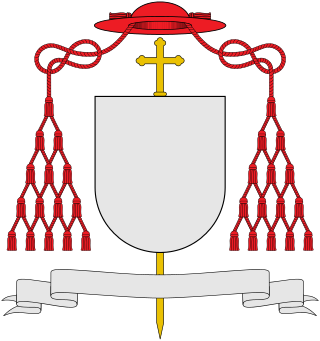
A cardinal is a senior member of the clergy of the Catholic Church. Cardinals are created by the pope and typically hold the title for life. Collectively, they constitute the College of Cardinals. The most solemn responsibility of the cardinals is to elect a new pope in a conclave, almost always from among themselves, when the Holy See is vacant. During the period between a pope's death or resignation and the election of his successor, the day-to-day governance of the Holy See is in the hands of the College of Cardinals. The right to participate in a conclave is limited to cardinals who have not reached the age of 80 years by the day the vacancy occurs. In addition, cardinals collectively participate in papal consistories, in which matters of importance to the Church are considered and new cardinals may be created. Cardinals of working age are also appointed to roles overseeing dicasteries of the Roman Curia, the central administration of the Catholic Church.
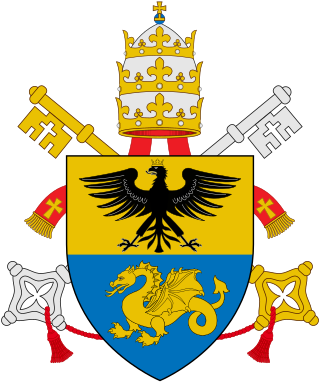
Pope Paul V, born Camillo Borghese, was head of the Catholic Church and ruler of the Papal States from 16 May 1605 to his death, in January 1621. In 1611, he honored Galileo Galilei as a member of the papal Accademia dei Lincei and supported his discoveries. In 1616, Pope Paul V instructed Cardinal Robert Bellarmine to inform Galileo that the Copernican theory could not be taught as fact, but Bellarmine's certificate allowed Galileo to continue his studies in search for evidence and use the geocentric model as a theoretical device. That same year Paul V assured Galileo that he was safe from persecution so long as he, the Pope, should live. Bellarmine's certificate was used by Galileo for his defense at the trial of 1633.
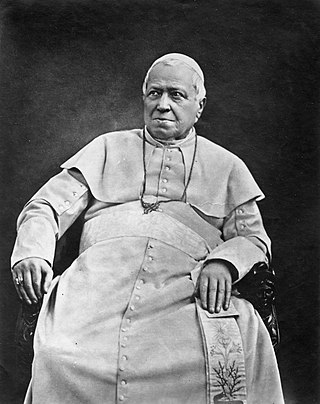
Pope Pius IX was head of the Catholic Church from 1846 to 1878. His reign of 32 years is the longest of any pope in history. He was notable for convoking the First Vatican Council in 1868 and for permanently losing control of the Papal States in 1870 to the Kingdom of Italy. Thereafter, he refused to leave Vatican City, declaring himself a "prisoner in the Vatican".
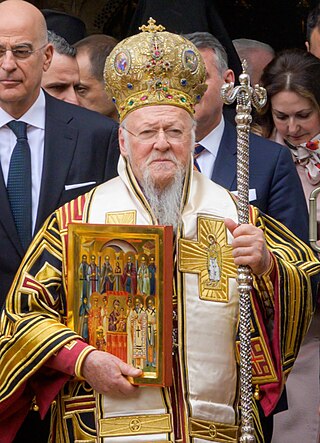
The ecumenical patriarch of Constantinople is the archbishop of Constantinople and primus inter pares among the heads of the several autocephalous churches that compose the Eastern Orthodox Church. The ecumenical patriarch is regarded as the representative and spiritual leader of the Eastern Orthodox Christians worldwide. The term ecumenical in the title is a historical reference to the Ecumene, a Greek designation for the civilised world, i.e. the Roman Empire, and it stems from Canon 28 of the Council of Chalcedon.

A prelate is a high-ranking member of the Christian clergy who is an ordinary or who ranks in precedence with ordinaries. The word derives from the Latin praelatus, the past participle of praeferre, which means 'carry before', 'be set above or over' or 'prefer'; hence, a prelate is one set over others.
An ecclesiastical court, also called court Christian or court spiritual, is any of certain courts having jurisdiction mainly in spiritual or religious matters. In the Middle Ages, these courts had much wider powers in many areas of Europe than before the development of nation states. They were experts in interpreting canon law, a basis of which was the Corpus Juris Civilis of Justinian, which is considered the source of the civil law legal tradition.

A consistory court is a type of ecclesiastical court, especially within the Church of England where they were originally established pursuant to a charter of King William the Conqueror, and still exist today, although since about the middle of the 19th century consistory courts have lost much of their subject-matter jurisdiction. Each diocese in the Church of England has a consistory court.
Consistory is the anglicized form of the consistorium, a council of the closest advisors of the Roman emperors. It can also refer to:

Giovanni Lajolo is an Italian cardinal and former president of the Pontifical Commission for Vatican City State and president of the Governatorate of Vatican City State.

A galero is a broad-brimmed hat with tasselated strings which was worn by clergy in the Catholic Church. Over the centuries, the red galero was restricted to use by individual cardinals while such other colors as black, green and violet were reserved to clergy of other ranks and styles.
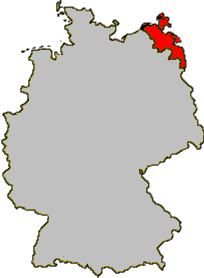
The Pomeranian Evangelical Church was a Protestant regional church in the German state of Mecklenburg-Vorpommern, serving the citizens living in Hither Pomerania. The Pomeranian Evangelical Church was based on the teachings brought forward by Martin Luther and other Reformators during the Reformation. It combined Lutheran and Reformed traditions. The seat of the church was Greifswald, the bishop's preaching venue was the former Collegiate Church of St. Nicholas in Greifswald.

Ercole Consalvi was a deacon and cardinal of the Catholic Church, who served twice as Cardinal Secretary of State for the Papal States and who played a crucial role in the post-Napoleonic reassertion of the legitimist principle of the divine right of kings, of which he was a constant supporter.

Luigi Maglione was an Italian prelate of the Catholic Church who joined the diplomatic service of the Holy See in 1908, served as a papal nuncio from 1920 to 1935. After a few years working in the Roman Curia, he was Secretary of State from 1939 until his death in 1944. He became an archbishop in 1920 and a Cardinal in 1935.
Chancellor is an ecclesiastical title used by several quite distinct officials of some Christian churches.
A provost is a senior official in a number of Christian churches.
Ecclesiastical jurisdiction is jurisdiction by church leaders over other church leaders and over the laity.
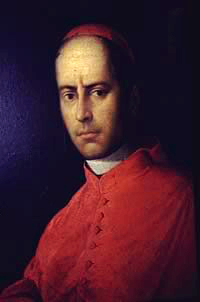
In the historical practice of the Catholic Church, a lay cardinal was a man whom the pope appointed to the College of Cardinals while still a layman. This appointment carried with it the obligation to be ordained to a clerical order, meaning that "lay cardinal" was not a permanent state, but a term in reference to a man who was appointed cardinal prior to taking on the clerical state corresponding to that appointment.
The history of the Roman Curia, the administrative apparatus responsible for managing the affairs of the Holy See and the Catholic Church, can be traced to the 11th century when informal methods of administration began to take on a more organized structure and eventually a bureaucratic form. The Curia has undergone a series of renewals and reforms, including a major overhaul following the loss of the Papal States, which fundamentally altered the range and nature of the Curia's responsibilities, removing many of an entirely secular nature.

In Protestant usage, a consistory designates certain ruling bodies in various churches. The meaning and the scope of functions varies strongly, also along the separating lines of the Protestant denominations and church bodies.

Mario Zenari is an Italian prelate of the Catholic Church who has been a cardinal since 2016. He has served his entire ecclesiastical career in the diplomatic service of the Holy See, holding senior positions beginning in 1999. He has been Apostolic Nuncio to Syria since 30 December 2008. He was nuncio to Sri Lanka from 2004 to 2008.